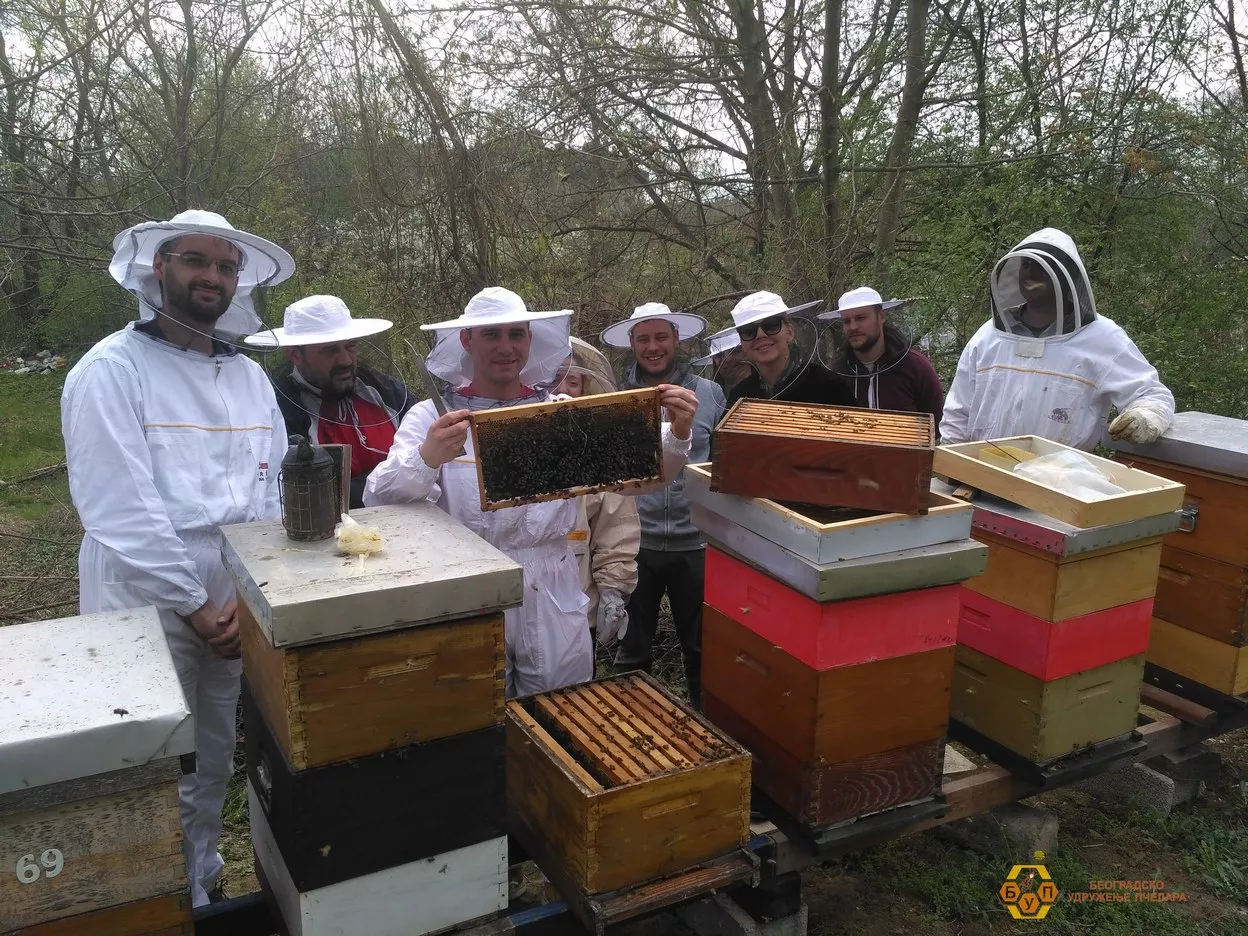Belgraders are creating a buzz about urban beekeeping
Do you know that bees are on the European Red List by The International Union for Conservation of Nature (IUCN)? Have you ever heard about a silent supersedure? How to fight Varroa destructor? How to collect propolis from the beehives? Do you know which sorts of honey have protected designation of origin (PDO) and protected geographical indication (PGI) in Serbia? What is Wangle dance? Perhaps you have noticed that linden, or more specifically, tree species of Tilia bloom for more than two months and are a huge source of food for bees in Belgrade? Have you got any idea how to perform the spring bee colony inspection step-by-step?
The answers to all of these questions and many others are to be found at the Urban Beekeeping Course for Beginners designed and realized by experts from Belgrade’s Beekeepers Association and Veles’ Vision CSO. Though Serbia is known for its rich biodiversity and a long beekeeping tradition the bee population diminishes the same way as it happens worldwide due to complex issues such as climate change, intensive agriculture, monocultures, overuse of pesticides etc. Needless to say that beekeeping is extremely important for ecology and humankind, not just for the production of honey, but also for bee pollination of almost 80% of flower wells. On the other hand, there is an evident lack of beekeeping courses and modules at the secondary level of formal education, the beekeepers’ guild is faced to an aging profession (average age of beekeepers in Serbia is 65 years old). Consequently those who begin to maintain beehives, but lacking basic skills and knowledge may unintentionally make more harm. Aimed to raise awareness of the importance of bees for human life, as well as the benefits of keeping them save in accordance with environmental sustainability, nature protection and preservation the first beekeeping course for beginners was designed in 2015.
Nowadays, the Urban Beekeeping for Beginners course is comprised of 3 main segments:
- 8 lectures (20 hours of theory related to topics such as basic bee biology, beehives and equipment maintenance, hive products, maintaining bee health, melliferous and pollen plants in Belgrade) which are scheduled from 18:00 to 20:00, starting 4th of March 2019 till 22nd of March 2019
- Practical field work with bee colonies supervised by professional beekeepers at Košutnjak apiary in April 2019

- Mentor’s support during one beekeeping season (till the end of October 2019)
Trainers are specialists in veterinary medicine, zoology, horticulture, apiculture, apitherapy and nutrition who are the members of Belgrade’s Beekeepers Association with many years of beekeeping experience. Mentor’s support e.g. the guidance and a practical work with colonies supervised by the experienced beekeeper is the guarantee that participants obtain practical skills required to work with a live honeybee colony. Some of them will become hobbyists, others professional beekeepers, but none of them will be left behind if troubles occur. Every participant gets one LR beehive, one nucleus and a beekeeper’s kit (a beekeeper’s hat, a hive tool and a smoker) by the end of supervised practice from Belgrade’s Beekeeping Association. At the award ceremony which is scheduled for 20th of May, World Bee Day, participant will receive the Certificates of Achievements.
Naturally the best insights of the course benefits and outcomes are participants’ impressions. Here are some of them shared.
“All the videos and lectures about the bees can’t be compared to this incredible moment of handling one frame in my hands. I’m overcoming fear of bees. I believe that I’ll fearlessly maintain a few beehives very soon.”said Jelena taking a bee frame in her hands for the first time in her life during supervised practice at the apiary.
Miloš (33), a former participant of beekeeping course for beginners in 2015 and an owner/beekeeper of 80 beehives now: “I felt honoured when my colleagues from Belgrade’s Beekeeper Association asked me to be a mentor to a new class of beekeepers beginners. At the beginning of my beekeeping practice it was hard, but I was determined. What’s more important, now I can see, my mentor Milan was patient. Bees demand patience and calmness. If they are treated well, if they are healthy, they are the most rewarding creatures on the Earth. I hope that I can confidently guide newcomers and share with them my experience.”
“I’m fascinated with a complex and beautiful bee life and their “society”. It is all about perfection, order, harmony. What also attract me to beekeepers community are their study trips to colleagues’ apiaries all over Serbia. I wonder how people live there, what they do.” Dragan (70) explained why he enrolled the Urban Beekeeping course for Beginners.
By the end of this article, please, take a few minutes and watch a former beekeeping course for beginners’ participant Bojan and his story about life changing experience and urban beekeeping:






More of these kind of popular education courses around Europe.